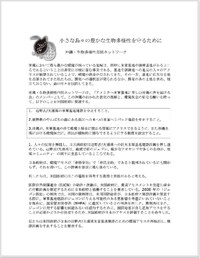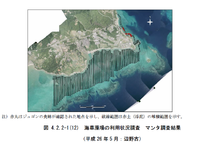訪米団:沖縄BD要請文(英文オリジナル)
2012年01月28日/ 訪米団
「アメリカへ米軍基地に苦しむ沖縄の声を届ける会」の、沖縄・生物多様性市民ネットワークの要請文です。


Save Our Small Islands and
Our Treasured Biodiversity
It is a compelling fact that the most unspoiled environmental areas in and around the islands of Okinawa are those where US bases and military training areas are located. Limitation imposed upon local people’s access to US military bases and training areas has helped conserve these environments. The occupation by US military bases of such a large area of the islands, on the other hand, has left us Okinawans with few options for development, forcing us to reclaim land and clear-cut forests in search of better land for development.
With understanding of this situation and the desire for better environmental conservation, Citizens’ Network for Biodiversity in Okinawa, as a member of the delegation from Okinawa, “Making Okinawan Voices Heard in America,” urge the US government to:
1. Ignoring people’s opposition, the US and Japanese governments have been pushing forward the plan to construct a massive US military base in Henoko/Oura Bay, where endangered Okinawa dugongs, rare blue corals, and many other wild wonders live around local communities.
The Japanese government uses its Environment Impact Assessment (EIA) process to force the plan forward, even while the EIA is being criticized as “unscientific” and “undemocratic.”
We believe that the US government has an obligation and responsibility to reconsider this process.
The International Union for Conservation of Nature (IUCN)’s Recommendations and Resolution requests that the US government works together with the Japanese government to complete the EIA and to set-up appropriate action plans. In the ruling of the “Dugong lawsuit” in 2008, the US court ruled that the US Department of Defense (DoD) violated the National Historical Preservation Act because it did not take into account the possible adverse effects on the dugong of construction of the military base in drawing up the construction plan with the Japanese government. The court also ordered the DoD to evaluate the EIA to determine whether modification is needed for the DoD to avoid or mitigate impacts on the dugong.
We request the US government to review the Japanese EIS for the base construction and to stop the construction plan.
2. Takae is located in the Yanbaru forest which is one of the richest areas of biodiversity in Japan. The forest is home to over 1,000 species of high plants and 5,000 species of animals, including numerous indigenous and endemic species such as the endangered Okinawa Woodpecker and Okinawa Rail.
Today, 30% of the forest is used as a US military training area, and 22 US military helipads already exist there. The construction of six new helipads will certainly create considerable danger to and further impact on the Yanbaru forest and the Takae community.
Local people, NGOs, scientists/experts, and international organizations including the IUCN have been requesting the Japanese government to reconsider the construction plan. Since 2007, the Okinawa Defense Bureau has attempted to carry out the construction, felling trees, throwing dirt and rocks in the Yanbaru forest amid protests by local people and their supporters.
It should be emphasized that the construction is not only destructing biodiversity; it is also violating the life and the rights of the local people who are in fact stewards of biodiversity and practitioners of sustainable living. The ODB has filed SLAPP lawsuits (Strategic Lawsuit Against Public Participation) against local people and their supporters who have been carrying out peaceful protests.
We strongly urge the US government to stop immediately the construction of the helipads in Takae.
3. Concerned citizens and NGOs have been addressing environment issues and biodiversity conservation in relation to US bases in Okinawa. These issues include air pollution, soil and water contamination, oil leakage, and mountain and bush fires.
We often face difficulties and constrains due to the peculiar political situation in which Okinawa is placed. The Japan-US Status of Forces Agreement (SOFA) makes it very difficult for citizens to have access to information concerning the environmental conditions of US bases in Okinawa. The US and Japan Joint Statement of Environmental Principles in 2000 and the Japan Environmental Governing Standards (JEGS) appear to remain as a token agreement as they imposes no obligation on the US military.
These conditions severely undermine our environment protection and conservation efforts concerning US bases.
We strongly call on the US government to establish a system to ensure that Okinawa has access to information regarding environmental issues of US bases and allow the public to be actively involved in environmental conservation in all areas of Okinawa.
2012-01-21


Save Our Small Islands and
Our Treasured Biodiversity
Citizens’ Network for Biodiversity in Okinawa
It is a compelling fact that the most unspoiled environmental areas in and around the islands of Okinawa are those where US bases and military training areas are located. Limitation imposed upon local people’s access to US military bases and training areas has helped conserve these environments. The occupation by US military bases of such a large area of the islands, on the other hand, has left us Okinawans with few options for development, forcing us to reclaim land and clear-cut forests in search of better land for development.
With understanding of this situation and the desire for better environmental conservation, Citizens’ Network for Biodiversity in Okinawa, as a member of the delegation from Okinawa, “Making Okinawan Voices Heard in America,” urge the US government to:
1. stop the construction of a US military base in Henoko/Oura Bay;
2. stop the construction of six US military helipads at Takae in the subtropical forest of Yanbaru;
3. establish a system to ensure that Okinawa has access to information regarding environmental issues and welfare of US bases and allow the public to be actively involved in environmental conservation in all areas of Okinawa..
1. Ignoring people’s opposition, the US and Japanese governments have been pushing forward the plan to construct a massive US military base in Henoko/Oura Bay, where endangered Okinawa dugongs, rare blue corals, and many other wild wonders live around local communities.
The Japanese government uses its Environment Impact Assessment (EIA) process to force the plan forward, even while the EIA is being criticized as “unscientific” and “undemocratic.”
We believe that the US government has an obligation and responsibility to reconsider this process.
The International Union for Conservation of Nature (IUCN)’s Recommendations and Resolution requests that the US government works together with the Japanese government to complete the EIA and to set-up appropriate action plans. In the ruling of the “Dugong lawsuit” in 2008, the US court ruled that the US Department of Defense (DoD) violated the National Historical Preservation Act because it did not take into account the possible adverse effects on the dugong of construction of the military base in drawing up the construction plan with the Japanese government. The court also ordered the DoD to evaluate the EIA to determine whether modification is needed for the DoD to avoid or mitigate impacts on the dugong.
We request the US government to review the Japanese EIS for the base construction and to stop the construction plan.
2. Takae is located in the Yanbaru forest which is one of the richest areas of biodiversity in Japan. The forest is home to over 1,000 species of high plants and 5,000 species of animals, including numerous indigenous and endemic species such as the endangered Okinawa Woodpecker and Okinawa Rail.
Today, 30% of the forest is used as a US military training area, and 22 US military helipads already exist there. The construction of six new helipads will certainly create considerable danger to and further impact on the Yanbaru forest and the Takae community.
Local people, NGOs, scientists/experts, and international organizations including the IUCN have been requesting the Japanese government to reconsider the construction plan. Since 2007, the Okinawa Defense Bureau has attempted to carry out the construction, felling trees, throwing dirt and rocks in the Yanbaru forest amid protests by local people and their supporters.
It should be emphasized that the construction is not only destructing biodiversity; it is also violating the life and the rights of the local people who are in fact stewards of biodiversity and practitioners of sustainable living. The ODB has filed SLAPP lawsuits (Strategic Lawsuit Against Public Participation) against local people and their supporters who have been carrying out peaceful protests.
We strongly urge the US government to stop immediately the construction of the helipads in Takae.
3. Concerned citizens and NGOs have been addressing environment issues and biodiversity conservation in relation to US bases in Okinawa. These issues include air pollution, soil and water contamination, oil leakage, and mountain and bush fires.
We often face difficulties and constrains due to the peculiar political situation in which Okinawa is placed. The Japan-US Status of Forces Agreement (SOFA) makes it very difficult for citizens to have access to information concerning the environmental conditions of US bases in Okinawa. The US and Japan Joint Statement of Environmental Principles in 2000 and the Japan Environmental Governing Standards (JEGS) appear to remain as a token agreement as they imposes no obligation on the US military.
These conditions severely undermine our environment protection and conservation efforts concerning US bases.
We strongly call on the US government to establish a system to ensure that Okinawa has access to information regarding environmental issues of US bases and allow the public to be actively involved in environmental conservation in all areas of Okinawa.
2012-01-21
Posted by 沖縄BD at 23:19│Comments(0)















